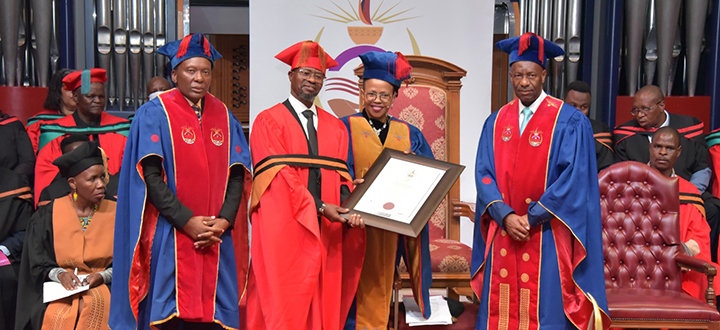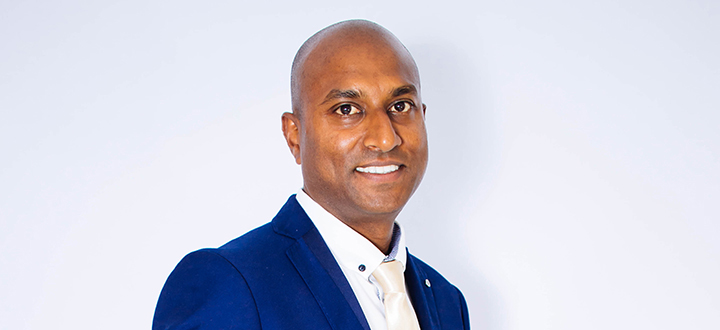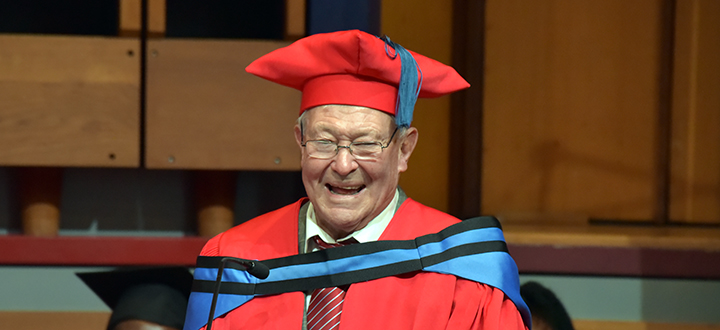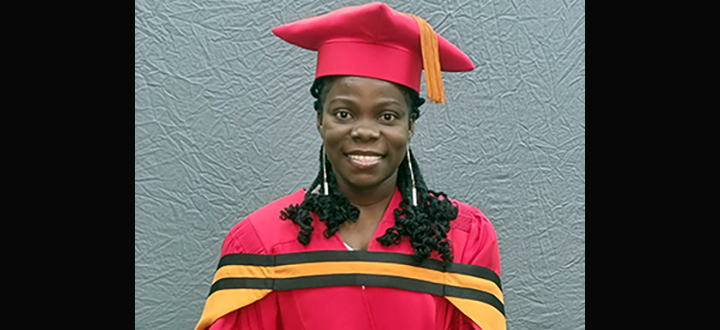News & Media
Embracing open distance e-learning and multiple discourses

Prof. Narend Baijnath (CEO: CHE), Prof. Velisiwe Gasa (Unisa), Prof. Som Naidu (Pro-Vice-Chancellor: University of the South Pacific, Fiji Islands), and Prof. Moeketsi Letseka (Unisa).
From 10 to 13 October 2017, the College of Education (CEDU) hosted the seventh annual Teacher Education at a Distance Conference at the scenic Ranch Resort Hotel in Polokwane. The purpose of this event was to open discourse under the theme of Embracing open distance e-learning and multiple discourses in teacher education.
Embracing multiple discourses
“It is always the most challenging thing to decide on a theme,” said Professor Velisiwe Gasa, opening the events and welcoming delegates. “We finally determined this to be the most fitting theme for this well-established part of the College of Education’s curriculum, which has grown from strength to strength over the years. It really affords us the opportunity to hear many voices, each giving their own unique stances on the subject of open, distance, and e-learning (ODeL).”
Constant change
I have seen many changes happening—forces of change that exist in society—and have been part of, and witnessed, the entire transformation in our education system. Specifically in higher education,” said Professor Narend Baijnath, CEO of the Council on Higher Education and former Pro-Vice-Chancellor of Unisa. “This conference makes its own contribution on how we can go forward with teacher education in the age of digitisation. It provides us with the opportunity to map out the terrain of teacher education and look at the challenges that befall us and also the possibilities. It gives us a closer look at the concept of digitisation and the possibilities it evokes for us in the development cause. Because that is our cause, regardless of what we are working with. We must contribute to that cause because it leads to a sustainable developed society where everyone is rich and prosperous.”
“We want to improve the general educational background of new teachers by increasing their understanding in curricula and pedagogy so that they, in turn, can understand children and the process of learning, because it is through understanding that we become good educators,” he went on to add, as he spoke in depth about the challenges faced by ODeL institutions when managing the task of educating teachers in an ever-changing, digitising world. “Continuing our professional education is important because the knowledge base of these teachers needs to be constantly updated and maintained. As we are academics and scholars, it is easy for us to be unimpressed by concepts, because we deal with very large ideas and theories all the time. But this is a change that is so big, so important, so influential, that we cannot afford to overlook its significance.”
The promise of digitisation
“What technology can offer falls into the purview of the craziest possibility that we can imagine,” continued Baijnath. “That is the world into which the people that we have trained and prepared are going. It is dominated by digitisation. That is the world that we must prepare them for.
On the question of education and its ultimate meaning, he noted that it cannot be argued that education contributes directly to economic growth, sustainable development, protection of the environment, social order, and humanitarian values. “The educational landscape is fast changing because of pressures put on us by globalisation. Teacher education must keep up with global developments, and the list gets longer and longer in terms of things and changes we need to keep an eye on. We must develop a group of teachers who are up to the challenge of developing a cohort of students. That is our challenge and our passion.”
In a constantly evolving global community, it is equally as important to foster individual growth as it is to seed the growth of communities. But globalisation is an unmovable force that offers more possibilities for positive change than it negatively impacts the system. Digitisation offers the collected knowledge and support of that same community and the more widespread global society and should be embraced for the positive impact it may ultimately have on the education system as a whole.
*By Carmen Taxer
Publish date: 2017-10-31 00:00:00.0

 Seven Unisans nominated for the NSTF-South32 Awards 2023/2024
Seven Unisans nominated for the NSTF-South32 Awards 2023/2024
 Unisa awards posthumous honorary doctorate to literary maven, OK Matsepe
Unisa awards posthumous honorary doctorate to literary maven, OK Matsepe
 From humble beginnings to academic leadership
From humble beginnings to academic leadership
 Community champion and agricultural entrepreneur extraordinaire honoured by Unisa
Community champion and agricultural entrepreneur extraordinaire honoured by Unisa
 Ghanaian-born Swede earns PhD in Information Sciences from Unisa
Ghanaian-born Swede earns PhD in Information Sciences from Unisa